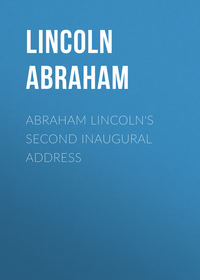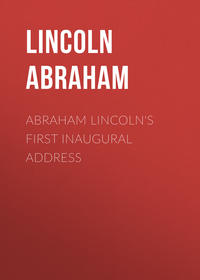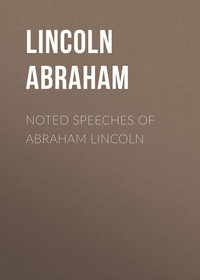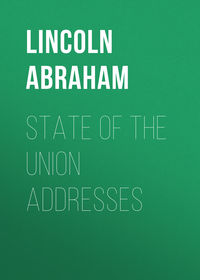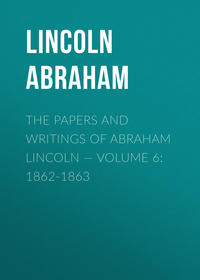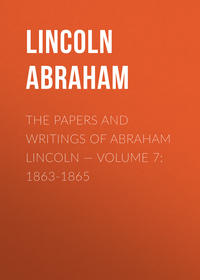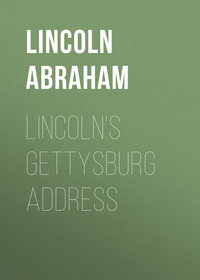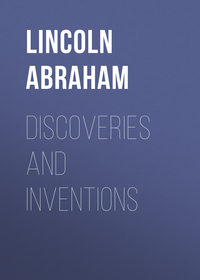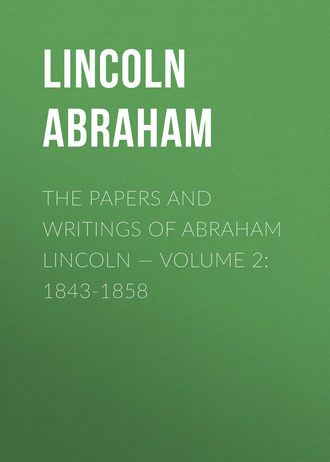 полная версия
полная версияThe Papers And Writings Of Abraham Lincoln — Volume 2: 1843-1858
Located at the seat of government of the State, he has been, for part if not the whole of the time he has held the office, a member of the Democratic State Central Committee, signing his name to their addresses and manifestoes; and has been, as I understand, reappointed by Mr. Polk since General Taylor's election. These are the facts of the case as I understand them, and I give no opinion of mine as to whether he should or should not be removed. My wish is that the department may adopt some proper general rule for such cases, and that Mr. Diller may not be made an exception to it, one way or the other.
Your obedient servant,
A. LINCOLN.
P. S. — This office, with its delivery, is entirely within my district; so that Colonel Baker, the other Whig representative, claims no voice in the appointment.L.
TO THE SECRETARY OF THE INTERIOR
SPRINGFIELD, ILLINOIS, April 7, 1849HON. SECRETARY OF THE HOME DEPARTMENT.
DEAR SIR: — I recommend that William Butler be appointed pension agent for the Illinois agency, when the place shall be vacant. Mr. Hurst, the present incumbent, I believe has performed the duties very well. He is a decided partisan, and I believe expects to be removed. Whether he shall, I submit to the department. This office is not confined to my district, but pertains to the whole State; so that Colonel Baker has an equal right with myself to be heard concerning it. However, the office is located here; and I think it is not probable that any one would desire to remove from a distance to take it.
Your obedient servant,
A. LINCOLN.
TO THOMPSON
SPRINGFIELD, April 25, 1849DEAR THOMPSON: A tirade is still kept up against me here for recommending T. R. King. This morning it is openly avowed that my supposed influence at Washington shall be broken down generally, and King's prospects defeated in particular. Now, what I have done in this matter I have done at the request of you and some other friends in Tazewell; and I therefore ask you to either admit it is wrong or come forward and sustain me. If the truth will permit, I propose that you sustain me in the following manner: copy the inclosed scrap in your own handwriting and get everybody (not three or four, but three or four hundred) to sign it, and then send it to me. Also, have six, eight or ten of our best known Whig friends there write to me individual letters, stating the truth in this matter as they understand it. Don't neglect or delay in the matter. I understand information of an indictment having been found against him about three years ago, for gaming or keeping a gaming house, has been sent to the department. I shall try to take care of it at the department till your action can be had and forwarded on.
Yours as ever,
A. LINCOLN.
TO THE SECRETARY OF THE INTERIOR
SPRINGFIELD ILLINOIS. May 10, 1849HON. SECRETARY OF THE INTERIOR.
DEAR SIR: — I regret troubling you so often in relation to the land-offices here, but I hope you will perceive the necessity of it, and excuse me. On the 7th of April I wrote you recommending Turner R. King for register, and Walter Davis for receiver. Subsequently I wrote you that, for a private reason, I had concluded to transpose them. That private reason was the request of an old personal friend who himself desired to be receiver, but whom I felt it my duty to refuse a recommendation. He said if I would transpose King and Davis he would be satisfied. I thought it a whim, but, anxious to oblige him, I consented. Immediately he commenced an assault upon King's character, intending, as I suppose, to defeat his appointment, and thereby secure another chance for himself. This double offence of bad faith to me and slander upon a good man is so totally outrageous that I now ask to have King and Davis placed as I originally recommended, — that is, King for register and Davis for receiver.
An effort is being made now to have Mr. Barret, the present register, retained. I have already said he has done the duties of the office well, and I now add he is a gentleman in the true sense. Still, he submits to be the instrument of his party to injure us. His high character enables him to do it more effectually. Last year he presided at the convention which nominated the Democratic candidate for Congress in this district, and afterward ran for the State Senate himself, not desiring the seat, but avowedly to aid and strengthen his party. He made speech after speech with a degree of fierceness and coarseness against General Taylor not quite consistent with his habitually gentlemanly deportment. At least one (and I think more) of those who are now trying to have him retained was himself an applicant for this very office, and, failing to get my recommendation, now takes this turn.
In writing you a third time in relation to these offices, I stated that I supposed charges had been forwarded to you against King, and that I would inquire into the truth of them. I now send you herewith what I suppose will be an ample defense against any such charges. I ask attention to all the papers, but particularly to the letters of Mr. David Mack, and the paper with the long list of names. There is no mistake about King's being a good man. After the unjust assault upon him, and considering the just claims of Tazewell County, as indicated in the letters I inclose you, it would in my opinion be injustice, and withal a blunder, not to appoint him, at least as soon as any one is appointed to either of the offices here.
Your obedient servant,
A. LINCOLN.
TO J. GILLESPIE
SPRINGFIELD, ILL., May 19, 1849DEAR GILLESPIE:
Butterfield will be commissioner of the Gen'l Land Office, unless prevented by strong and speedy efforts. Ewing is for him, and he is only not appointed yet because Old Zach. hangs fire.
I have reliable information of this. Now, if you agree with me that this appointment would dissatisfy rather than gratify the Whigs of this State, that it would slacken their energies in future contests, that his appointment in '41 is an old sore with them which they will not patiently have reopened, — in a word that his appointment now would be a fatal blunder to the administration and our political men here in Illinois, write Crittenden to that effect. He can control the matter. Were you to write Ewing I fear the President would never hear of your letter. This may be mere suspicion. You might write directly to Old Zach. You will be the best judge of the propriety of that. Not a moment's time is to be lost.
Let this be confidential except with Mr. Edwards and a few others whom you know I would trust just as I do you.
Yours as ever,
A. LINCOLN.
REQUEST FOR GENERAL LAND-OFFICE APPPOINTMENT
TO E. EMBREE[Confidential]
SPRINGFIELD, ILLINOIS, May 25, 1849.
HON. E. EMBREE
DEAR SIR: — I am about to ask a favor of you, one which I hope will not cost you much. I understand the General Land-Office is about to be given to Illinois, and that Mr. Ewing desires Justin Butterfield, of Chicago, to be the man. I give you my word, the appointment of Mr. Butterfield will be an egregious political blunder. It will give offence to the whole Whig party here, and be worse than a dead loss to the administration of so much of its patronage. Now, if you can conscientiously do so, I wish you to write General Taylor at once, saying that either I or the man I recommend should in your opinion be appointed to that office, if any one from Illinois shall be. I restrict my request to Illinois because you may have a man from your own State, and I do not ask to interfere with that.
Your friend as ever,
A. LINCOLN.
REQUEST FOR A PATENT
IMPROVED METHOD OF LIFTING VESSELS OVER SHOALSApplication for Patent:
What I claim as my invention, and desire to secure by letters patent, is the combination of expansible buoyant chambers placed at the sides of a vessel with the main shaft or shafts by means of the sliding spars, which pass down through the buoyant chambers and are made fast to their bottoms and the series of ropes and pulleys or their equivalents in such a manner that by turning the main shaft or shafts in one direction the buoyant chambers will be forced downward into the water, and at the same time expanded and filled with air for buoying up the vessel by the displacement of water, and by turning the shafts in an opposite direction the buoyant chambers will be contracted into a small space and secured against injury.
A. LINCOLN.
TO THE SECRETARY OF INTERIOR
SPRINGFIELD, ILL., June 3, 1849HON. SECRETARY OF INTERIOR.
DEAR SIR: — Vandalia, the receiver's office at which place is the subject of the within, is not in my district; and I have been much perplexed to express any preference between Dr. Stapp and Mr. Remann. If any one man is better qualified for such an office than all others, Dr. Stapp is that man; still, I believe a large majority of the Whigs of the district prefer Mr. Remann, who also is a good man. Perhaps the papers on file will enable you to judge better than I can. The writers of the within are good men, residing within the land district.
Your obt. servant,
A. LINCOLN.
TO W. H. HERNDON
SPRINGFIELD, June 5, 1849DEAR WILLIAM: — Your two letters were received last night. I have a great many letters to write, and so cannot write very long ones. There must be some mistake about Walter Davis saying I promised him the post-office. I did not so promise him. I did tell him that if the distribution of the offices should fall into my hands, he should have something; and if I shall be convinced he has said any more than this, I shall be disappointed. I said this much to him because, as I understand, he is of good character, is one of the young men, is of the mechanics, and always faithful and never troublesome; a Whig, and is poor, with the support of a widow mother thrown almost exclusively on him by the death of his brother. If these are wrong reasons, then I have been wrong; but I have certainly not been selfish in it, because in my greatest need of friends he was against me, and for Baker.
Yours as ever,
A. LINCOLN.
P. S. Let the above be confidential.
TO J. GILLESPIE
DEAR GILLESPIE:Mr. Edwards is unquestionably offended with me in connection with the matter of the General Land-Office. He wrote a letter against me which was filed at the department.
The better part of one's life consists of his friendships; and, of them, mine with Mr. Edwards was one of the most cherished. I have not been false to it. At a word I could have had the office any time before the department was committed to Mr. Butterfield, at least Mr. Ewing and the President say as much. That word I forbore to speak, partly for other reasons, but chiefly for Mr. Edwards' sake, losing the office (that he might gain it) I was always for; but to lose his friendship, by the effort for him, would oppress me very much, were I not sustained by the utmost consciousness of rectitude. I first determined to be an applicant, unconditionally, on the 2nd of June; and I did so then upon being informed by a telegraphic despatch that the question was narrowed down to Mr. B and myself, and that the Cabinet had postponed the appointment three weeks, for my benefit. Not doubting that Mr. Edwards was wholly out of the question I, nevertheless, would not then have become an applicant had I supposed he would thereby be brought to suspect me of treachery to him. Two or three days afterwards a conversation with Levi Davis convinced me Mr. Edwards was dissatisfied; but I was then too far in to get out. His own letter, written on the 25th of April, after I had fully informed him of all that had passed, up to within a few days of that time, gave assurance I had that entire confidence from him which I felt my uniform and strong friendship for him entitled me to. Among other things it says, "Whatever course your judgment may dictate as proper to be pursued, shall never be excepted to by me." I also had had a letter from Washington, saying Chambers, of the Republic, had brought a rumor then, that Mr. E had declined in my favor, which rumor I judged came from Mr. E himself, as I had not then breathed of his letter to any living creature. In saying I had never, before the 2nd of June, determined to be an applicant, unconditionally, I mean to admit that, before then, I had said substantially I would take the office rather than it should be lost to the State, or given to one in the State whom the Whigs did not want; but I aver that in every instance in which I spoke of myself, I intended to keep, and now believe I did keep, Mr. E above myself. Mr. Edwards' first suspicion was that I had allowed Baker to overreach me, as his friend, in behalf of Don Morrison. I knew this was a mistake; and the result has proved it. I understand his view now is, that if I had gone to open war with Baker I could have ridden him down, and had the thing all my own way. I believe no such thing. With Baker and some strong man from the Military tract & elsewhere for Morrison, and we and some strong man from the Wabash & elsewhere for Mr. E, it was not possible for either to succeed. I believed this in March, and I know it now. The only thing which gave either any chance was the very thing Baker & I proposed, — an adjustment with themselves.
You may wish to know how Butterfield finally beat me. I can not tell you particulars now, but will when I see you. In the meantime let it be understood I am not greatly dissatisfied, — I wish the offer had been so bestowed as to encourage our friends in future contests, and I regret exceedingly Mr. Edwards' feelings towards me. These two things away, I should have no regrets, — at least I think I would not.
Write me soon.
Your friend, as ever,
A. LINCOLN.
RESOLUTIONS OF SYMPATHY WITH THE CAUSE OF HUNGARIAN FREEDOM,
SEPTEMBER [1??], 1849At a meeting to express sympathy with the cause of Hungarian freedom, Dr. Todd, Thos. Lewis, Hon. A. Lincoln, and Wm. Carpenter were appointed a committee to present appropriate resolutions, which reported through Hon. A. Lincoln the following:
Resolved, That, in their present glorious struggle for liberty, the Hungarians command our highest admiration and have our warmest sympathy.
Resolved, That they have our most ardent prayers for their speedy triumph and final success.
Resolved, That the Government of the United States should acknowledge the independence of Hungary as a nation of freemen at the very earliest moment consistent with our amicable relations with the government against which they are contending.
Resolved, That, in the opinion of this meeting, the immediate acknowledgment of the independence of Hungary by our government is due from American freemen to their struggling brethren, to the general cause of republican liberty, and not violative of the just rights of any nation or people.
TO Dr. WILLIAM FITHIAN
SPRINGFIELD, Sept. 14, 1849Dr. WILLIAM FITHIAN, Danville, Ill.
DEAR DOCTOR: — Your letter of the 9th was received a day or two ago. The notes and mortgages you enclosed me were duly received. I also got the original Blanchard mortgage from Antrim Campbell, with whom Blanchard had left it for you. I got a decree of foreclosure on the whole; but, owing to there being no redemption on the sale to be under the Blanchard mortgage, the court allowed Mobley till the first of March to pay the money, before advertising for sale. Stuart was empowered by Mobley to appear for him, and I had to take such decree as he would consent to, or none at all. I cast the matter about in my mind and concluded that as I could not get a decree we would put the accrued interest at interest, and thereby more than match the fact of throwing the Blanchard debt back from twelve to six per cent., it was better to do it. This is the present state of the case.
I can well enough understand and appreciate your suggestions about the Land-Office at Danville; but in my present condition, I can do nothing.
Yours, as ever,
A. LINCOLN.
SPRINGFIELD, Dec. 15, 1849
— ESQDEAR SIR: — On my return from Kentucky I found your letter of the 7th of November, and have delayed answering it till now for the reason I now briefly state. From the beginning of our acquaintance I had felt the greatest kindness for you and had supposed it was reciprocated on your part. Last summer, under circumstances which I mentioned to you, I was painfully constrained to withhold a recommendation which you desired, and shortly afterwards I learned, in such a way as to believe it, that you were indulging in open abuse of me. Of course my feelings were wounded. On receiving your last letter the question occurred whether you were attempting to use me at the same time you would injure me, or whether you might not have been misrepresented to me. If the former, I ought not to answer you; if the latter, I ought, and so I have remained in suspense. I now enclose you the letter, which you may use if you see fit.
Yours, etc.,
A. LINCOLN.
1850
RESOLUTIONS ON THE DEATH OF JUDGE NATHANIEL POPE
Circuit and District Court of the U. S. in and for the State and District of Illinois. Monday, June 3, 1850.
On the opening of the Court this morning, the Hon. A. Lincoln, a member of the Bar of this Court, suggested the death of the Hon. Nathaniel Pope, late a judge of this Court, since the adjournment of the last term; whereupon, in token of respect for the memory of the deceased, it is ordered that the Court do now adjourn until to-morrow morning at ten o'clock.
The Hon. Stephen T. Logan, the Hon. Norman H. Purple, the Hon. David L. Gregg, the Hon. A. Lincoln, and George W. Meeker, Esq., were appointed a Committee to prepare resolutions.
Whereupon, the Hon. Stephen T. Logan, in behalf of the Committee, presented the following preamble and resolutions:
Whereas The Hon. Nathaniel Pope, District Judge of the United States Court for the District of Illinois, having departed this life during the last vacation of said Court, and the members of the Bar of said Court, entertaining the highest veneration for his memory, a profound respect for his ability, great experience, and learning as a judge, and cherishing for his many virtues, public and private, his earnest simplicity of character and unostentatious deportment, both in his public and private relations, the most lively and affectionate recollections, have
Resolved, That, as a manifestation of their deep sense of the loss which has been sustained in his death, they will wear the usual badge of mourning during the residue of the term.
Resolved, That the Chairman communicate to the family of the deceased a copy of these proceedings, with an assurance of our sincere condolence on account of their heavy bereavement.
Resolved, That the Hon. A. Williams, District Attorney of this Court, be requested in behalf of the meeting to present these proceedings to the Circuit Court, and respectfully to ask that they may be entered on the records.
E. N. POWELL, Sec'y. SAMUEL H. TREAT, Ch'n.
NOTES FOR LAW LECTURE
(fragments)JULY 1, 1850
DISCOURAGE LITIGATION. Persuade your neighbors to compromise whenever you can. Point out to them how the nominal winner is often a real loser — in fees, expenses, and waste of time. As a peace-maker the lawyer has a superior opportunity of being a good man. There will still be business enough.
Never stir up litigation. A worse man can scarcely be found than one who does this. Who can be more nearly a fiend than he who habitually over-hauls the register of deeds in search of defects in titles, whereon to stir up strife, and put money in his pocket? A moral tone ought to be infused into the profession which should drive such men out of it.
The matter of fees is important, far beyond the mere question of bread and butter involved. Properly attended to, fuller justice is done to both lawyer and client. An exorbitant fee should never be claimed. As a general rule never take your whole fee in advance, nor any more than a small retainer. When fully paid beforehand, you are more than a common mortal if you can feel the same interest in the case as if something was still in prospect for you, as well as for your client. And when you lack interest in the case the job will very likely lack skill and diligence in the performance. Settle the amount of fee and take a note in advance. Then you will feel that you are working for something, and you are sure to do your work faithfully and well. Never sell a fee note — at least not before the consideration service is performed. It leads to negligence and dishonesty — negligence by losing interest in the case, and dishonesty in refusing to refund when you have allowed the consideration to fail.
This idea of a refund or reduction of charges from the lawyer in a failed case is a new one to me — but not a bad one.
1851
LETTERS TO FAMILY MEMBERS
TO JOHN D. JOHNSTON
January 2, 1851DEAR JOHNSTON: — Your request for eighty dollars I do not think it best to comply with now. At the various times when I have helped you a little you have said to me, "We can get along very well now"; but in a very short time I find you in the same difficulty again. Now, this can only happen by some defect in your conduct. What that defect is, I think I know. You are not lazy, and still you are an idler. I doubt whether, since I saw you, you have done a good whole day's work in any one day. You do not very much dislike to work, and still you do not work much merely because it does not seem to you that you could get much for it. This habit of uselessly wasting time is the whole difficulty; it is vastly important to you, and still more so to your children, that you should break the habit. It is more important to them, because they have longer to live, and can keep out of an idle habit before they are in it, easier than they can get out after they are in.
You are now in need of some money; and what I propose is, that you shall go to work, "tooth and nail," for somebody who will give you money for it. Let father and your boys take charge of your things at home, prepare for a crop, and make the crop, and you go to work for the best money wages, or in discharge of any debt you owe, that you can get; and, to secure you a fair reward for your labor, I now promise you, that for every dollar you will, between this and the first of May, get for your own labor, either in money or as your own indebtedness, I will then give you one other dollar. By this, if you hire yourself at ten dollars a month, from me you will get ten more, making twenty dollars a month for your work. In this I do not mean you shall go off to St. Louis, or the lead mines, or the gold mines in California, but I mean for you to go at it for the best wages you can get close to home in Coles County. Now, if you will do this, you will be soon out of debt, and, what is better, you will have a habit that will keep you from getting in debt again. But, if I should now clear you out of debt, next year you would be just as deep in as ever. You say you would almost give your place in heaven for seventy or eighty dollars. Then you value your place in heaven very cheap, for I am sure you can, with the offer I make, get the seventy or eighty dollars for four or five months' work. You say if I will furnish you the money you will deed me the land, and, if you don't pay the money back, you will deliver possession. Nonsense! If you can't now live with the land, how will you then live without it? You have always been kind to me, and I do not mean to be unkind to you. On the contrary, if you will but follow my advice, you will find it worth more than eighty times eighty dollars to you.


